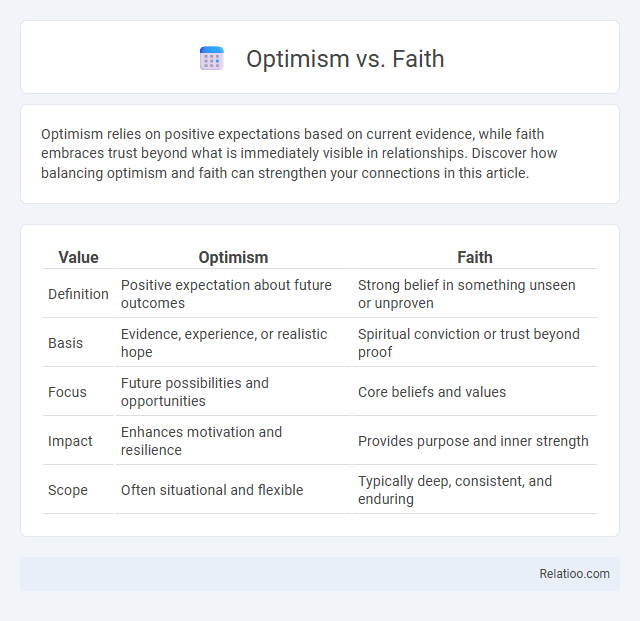Optimism relies on positive expectations based on current evidence, while faith embraces trust beyond what is immediately visible in relationships. Discover how balancing optimism and faith can strengthen your connections in this article.
Table of Comparison
| Value | Optimism | Faith |
|---|---|---|
| Definition | Positive expectation about future outcomes | Strong belief in something unseen or unproven |
| Basis | Evidence, experience, or realistic hope | Spiritual conviction or trust beyond proof |
| Focus | Future possibilities and opportunities | Core beliefs and values |
| Impact | Enhances motivation and resilience | Provides purpose and inner strength |
| Scope | Often situational and flexible | Typically deep, consistent, and enduring |
Understanding Optimism: Definition and Core Principles
Optimism is a cognitive attitude characterized by the expectation of positive outcomes based on evidence and rationale, contrasting with faith, which entails belief without empirical proof. Its core principles include resilience, proactive problem-solving, and a bias toward hopeful interpretations of events. Understanding optimism involves recognizing its role in enhancing psychological well-being and motivating constructive behavior through realistic positivity.
Defining Faith: Meaning and Philosophical Roots
Faith encompasses a deep trust and conviction that transcends empirical evidence, rooted in philosophical traditions such as existentialism, theology, and epistemology. Unlike optimism, which is the hopeful expectation of positive outcomes, faith implies a steadfast belief often grounded in spiritual or metaphysical assurance. The philosophical roots of faith trace back to thinkers like Kierkegaard and Aquinas, who emphasized faith as a commitment beyond rational proof.
Key Differences Between Optimism and Faith
Optimism relies on a positive expectation based on evidence or experience, while faith involves belief without requiring empirical proof. Optimism is often grounded in realistic assessments and probability, whereas faith embraces trust beyond observable data. Key differences include optimism's dependence on rationality and faith's basis in spiritual or personal conviction.
How Optimism Shapes Perception and Behavior
Optimism influences your perception by fostering a positive outlook that highlights opportunities and solutions, which can enhance motivation and resilience in various situations. This mindset encourages proactive behavior, leading to persistence despite challenges and increased likelihood of achieving goals. While faith often provides a spiritual foundation and belief in outcomes beyond control, optimism specifically drives practical actions grounded in hopeful expectations.
The Role of Faith in Overcoming Adversity
Faith acts as a powerful anchor during adversity, providing inner strength and resilience that optimism alone may lack. While optimism fosters a positive outlook, faith offers deeper meaning and purpose, enabling you to endure challenges with hope and conviction. Integrating faith into your mindset enhances emotional stability and empowers you to overcome hardships more effectively.
Psychological Benefits: Optimism vs Faith
Optimism fosters psychological resilience by promoting positive expectations about future outcomes, boosting your motivation and reducing stress through a hopeful mindset. Faith enhances emotional well-being by providing a deep sense of purpose, community support, and existential meaning that can buffer against anxiety and depression. Both optimism and faith contribute uniquely to mental health, with optimism focusing on cognitive positivity and faith shaping spiritual reassurance.
Real-World Examples: When Optimism and Faith Diverge
Optimism often relies on evidence-based expectations for positive outcomes, exemplified by entrepreneurs who anticipate business success through market analysis. Faith centers on unwavering belief without empirical proof, such as religious individuals trusting divine intervention during crises. When optimism and faith diverge, climate activists may pragmatically push for policy changes based on scientific data, while others rely on faith in humanity's moral progress despite uncertain environmental futures.
Can Optimism and Faith Coexist?
Optimism and faith often coexist as complementary forces, with optimism relying on positive expectations based on evidence or experience, while faith involves trust without requiring empirical proof. Studies in psychology suggest that combining optimism with faith can enhance resilience and emotional well-being by fostering hope and purpose during uncertainty. This synergy enables individuals to maintain a positive outlook while drawing strength from spiritual or deeply held beliefs.
Choosing the Right Mindset for Personal Growth
Choosing the right mindset for personal growth involves understanding the nuanced differences between optimism, faith, and positivity. Optimism relies on expecting favorable outcomes based on evidence and experience, while faith embodies a deep trust or belief often without empirical proof, and positivity focuses on maintaining a constructive attitude regardless of circumstances. Your ability to balance these elements strategically can empower resilience, motivation, and effective decision-making on your growth journey.
Conclusion: Navigating Life with Optimism or Faith
Navigating life with optimism empowers you to focus on positive outcomes and resilience during challenges, while faith offers a deeper sense of purpose and trust in a higher power beyond visible circumstances. Balancing optimism with faith can provide both practical motivation and spiritual strength, helping you face uncertainty with hope and confidence. Your ability to integrate these approaches guides your mindset and emotional well-being through life's complexities.

Infographic: Optimism vs Faith
 relatioo.com
relatioo.com